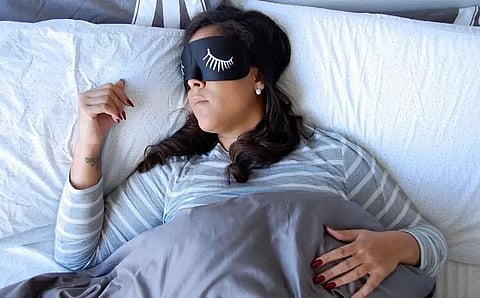
- Home
- Live Blog
- Breaking News
- Top Headlines
- Cities
- NE News
- Sentinel Media
- Sports
- Education
- Jobs

Moitrayee Das
(moitrayee.das@flame.edu.in)
Sleep is an indispensable part of our life. It is vital for the normal functioning of an individual. Short hours of sleep and poor quality sleep can harm all aspects of an individual's daily functioning (attention, memory, language, reasoning, decision-making, and learning). Therefore, good sleep is vital to better performance across professions. Even so, it is found that insomnia is speedily growing as a global health issue. Several hazards have been created in the workplace, referable to as insomnia. Some clinical studies about sleep show that about 4 per cent to 5% of the population in the west is affected by a problem called excessive daytime sleepiness (EDS) (Ulfberg et al., 1996).
Working shifts have become integral to modern industrial life (Akerstedt & Wright, 2009). In India, the shift system, in one form or another, has been in existence for more than 70 years (Verhaegen et al., 1987). It started in docks and textile mills and has spread to all industries continuously (Boggild & Knutsson, 1999). In constantly running plants, working in three shifts is inevitable (Folkard & Tucker, 2003). Shift work interferes with the general life of an individual as compared to those working day shifts or what is commonly known as general shifts (Anderson & Bremer, 1987). Studies have shown that workers on rotating shifts are sleepless and get only 5.6 hours of sleep on average compared to those on a non-shift basis for 24 hours (Boggild & Knutsson, 1999). Insomnia seems to be a common problem among rotating shift workers (Holbrook, White & Hitt, 1994). A study by Palo and Das (2021) found that of 275 rotating shift workers they studied, 11 per cent of the workers working rotating shifts suffer from poor sleep quality.
Molecular and hormonal problems in the body are highly possible due to irregular work schedules or working in shifts. It can obstruct a person's day-to-day functioning (Wirth MD et al., 2017). Most studies, primarily in sleep and shift work, have often found that the risk of accidents increases due to sleepiness (Bonnet, 1985). Sleep-related problems involving sleep attacks are common among shift workers, eventually leading to sleepiness during their respective shifts (Sandberg et al., 2011). It has far-reaching implications for the off-shift well-being of the workers as well. However, a few studies have considered shift work and its relationship with on- and off-shift outcomes in Indian organizations.
Countless research evidence has shown how poor sleep leads to health problems like obesity, hypertension, diabetes, and deteriorating mental health, among other issues (Palo, S. & Das, 2021). Lack of sleep affects not only the employee but also has a considerable impact on their employer (Barnes et al., 2016; Sonnetag, 2003). Poor sleep hygiene puts the individual at risk for occupational accidents (Philip & Akerstedt, 2006). Sleep-deprived workers are also more likely to engage in workplace deviant behaviour (Deng et al., 2022). The probability of indulging in immoral behaviour, such as a low tolerance level, is highly dependent on the quantity and quality of the night's sleep (Kühnel & Feuerhahn, 2016).
Clinical studies have shown that the rate of mental disorders is higher among shift workers compared to non-shift workers (Cheng W & Cheng Y, 2016). Shift work is primarily understood as working outside the regular 9 am to 5 pm hours. Sleep disturbance is common in shift workers because of the disorder of circadian rhythm, which is essential for the usual good health of a person. This circadian rhythm is mainly sporadic among night shift workers. The hyperbolic white blood cell increase has been observed in the shift workers compared to non-shift workers. Research has found that shift workers have hyperbolic white blood cell counts compared to non-shift workers, reducing their immunity level (Boggild & Knutsson, 1999).
Sleep is one such health concern that is still not taken seriously by the majority (employers and employees) in the organizational set-up because the thought is always, 'how bad can it get'. This outlook toward sleep needs to change, and it is high time to make the change required. Third, research data explaining the relationship between sleep and shift workers will help experts work on cutting-edge systems that would appreciate the similarities and differences in the human sleep cycle to prevent occupational hazards. It will also help deal with multiple health problems due to varying work timings (Leger et al., 2002).
It is time to realize that our limited sleep should not be worn as a 'badge of honour to prove our commitment and dedication towards our work. The well-being of the organization lies entirely in the well-being of the employees. If employees are not healthy there will be disturbing repercussions not just for the employees but also for the eventual profitability of the organization. Numerous studies have shown how organizations have lost a huge sum of money on employees' health and increased sick leaves.
There needs to be a huge shift in the work culture that promotes unhealthy workplace behaviour to one that truly acknowledges and cares about the concerns and problems of the employees. Certain unhealthy practices such as encouraging overtime to stay, work communication post-work hours, equating 'busyness' with productivity, workplace gossip, discouraging holidays and leisure time, rest/vacation shaming, inadequate rest breaks or restrooms among many others play a significant role in deciding the future work culture of the organizations. Sleep is a necessity, not a luxury. We do not need to earn our rest time, we deserve it.